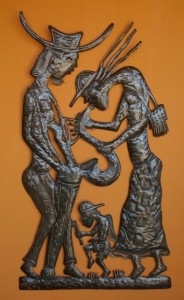The Battle of Vertieres

The Battle of Vertieres is celebrated in Haiti today with parades and speeches by prominent public figures. This sculpture by Julio Balan, called “Dancing in the Street” illustrates the joy and patriotic pride of the holiday.
Today from coast to coast, Americans are observing Thanksgiving, in memory of our early history and a time when colonists and the native population worked together in friendship to insure the prosperity of all. Their feast of celebration acknowledged the good fortune and security of a bountiful harvest and now, following the tradition of centuries, we commemorate that event with feasting, family, friendship, and collective reflection.
Ten days earlier, Haitians celebrated a national holiday of no less significance in terms of the mark of history upon their country. The Battle of Vertieres was fought on November 18, 1803 and marked the beginning of the end of French tyranny on the island colony of Saint-Domingue, now Haiti and Dominican Republic, and the birth of the first free black republic in the New World.
General Francois Capois, along with General Jean-Jacques Dessaline, lead the momentous final assault near Cape Haitien on the northeast coast. In a remarkable act of courage, Capois rode into a fearsome barrage of French fire, head held high and colors flying. His horse was killed and fell from beneath him, but the general kept up his charge, drawing his sword and urging his troops onward, crying, “Forward, forward!” The opposing general, impressed with the unflinching bravery of his adversary, called a momentary cease-fire and sent a messenger, who told Capois, “General Compte de Rochambeau sends his compliments to the general who has covered himself in such glory.” The messenger saluted Capois, turned on his heel, retreated to his position, and the battle thereupon resumed.
Despite the superior numbers of the 30,000-strong French Expeditionary Force sent by Napoleon Bonaparte, the Haitians gained the upper hand and forced the French to abandon the fight. This defeat was a major blow to the French empire, having been cut off from its biggest source of income: the profits of plantation slave labor in Saint-Domingue. Immediately following the Haitian victory, Generals Petion, Dessalines, and Clarvaux met at Fort Liberte and laid out the foundations of the republic’s newly won independence.
Today the occasion is marked in Haiti with parades and speeches by public luminaries. View photos of the 2011 celebration as recorded by Adam Bacher in Cap Haitien here: http://portraitsofhaiti.com/category/cape-haitian/
Contributed by Linda for Beyond Borders/It’s Cactus
